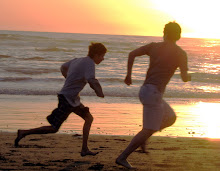Dec 31, 2004
Rabat demonstration
Rabat. Late Afternoon. Driving along Avenue Mohammed V, we passed a demonstration in the park opposite the Chambres des Representants. We registered in the hotel and I went off to photograph what I could. As soon as I got to the park I was surrounded by protestors. They identified themselves as members of the Union Des Cadres Superieurs Chomeurs. In effect, the union of unemployed academics. According to a handout there are 491 members of which the majority teach Islamic studies, Arabic literature or Chemistry. Slightly more men than women; most come from Rabat, Fez, or Casa. The great majority under 35. One person told me these demonstrations have become increasingly frequent, almost once a week. Someone else used the word "massacre" to describe what often happens when police arrive but I didn't see any violence. Nevertheless, as the night came on and the soldiers drew a cordon around the demonstration several people asked that so long as journalists stayed the protestors would be safe. There was a local TV film crew as well as a wire reporter, and perhaps others.
The object of the demonstration was to deliver to a government minister a long heavy scroll that included a list of demands for jobs and a few signatures signed in blood. I saw one of those signings myself. The marchers organized and walked south to the Avenue Moulay Hassan, and with the lights of the Sunna Mosque just coming on, they came up against a wall of soldiers, young recruits, with billy clubs held behind their backs.
A government representative appeared, and, looking very relaxed, smiling in all directions, talked briefly with the protestors. But they wanted to deliver their message to a specific minister and when rebuffed pressed against the soldiers. The representative called to plain clothes men behind him who in turn called in a few meatier soldiers, older and buffed, in dark blue uniforms with red patches saying police on their sleeves. They pressed against the back of the soldiers and moved a small group of protestors back across a blocked street to where the mass was sitting down, partly in the street.
Eventually, the government representative seemed to figure out that if he moved around to the east the protestors would follow and unclog the intersection. People trying to get out of centre ville were howling inside their cars in frustration; they seemed to be mostly annoyed with the protestors.
You realize this is a progressive country, but also conservative. Not in a religious sense but in a secular one. The ruling class don't seem to have much interest in changing the status quo. And you see that often in their children. Certainly, that's been my experience.
I spoke to some 10th graders a few weeks ago. All from wealthy families. A girl wanted to go live with the Taliban in Afganistan. Another wanted thought Morocco was too liberal. Still another said that after superman, Osama Bin Laden is his hero. "Why"? Because he took on the Americans. "Do you think Arab countries are better off now than before 911?" Absolutely.
On the other hand, I spoke to some 12th graders. To a person they love their country but they all want to leave. None wnat to go to college here. A few of them cited corruption as the principal reason to leave.
As the protestors faded into the dark to the east I went back to the hotel. A man stopped me. He was black. Speaking in French he said, please record this; you are our only hope for democracy. I smiled, said I would. Of course. But as he said I thought of Iraq. Do it yourself, I thought. It will be better in the end. May take longer but at less cost. Iraq: A war I supported initially, not for the WMDs but for the Kurds if no one else and the Shiites in Basra, but now I've come to think that democracy is not a product to be exported. It may seem like everyone must want it, but that's not true and it's not enough. And this is a culture built on cults of personality. Better to choose a benign dictator in the short run. If you want to support democracy, support the people that want it, no matter their persuasion.
You think of the authors of pre-emption and perhaps they as architects have made the same mistake as the people who misinterpreted Dr. X's notion of containment. K's idea was that communism was more vulnerable to economic pressure than military pressure. And so it was. Now the notion is that more force at a point, early on, will prevent catastrophe. Perhaps. But here in Morocco the winter of discontent is a measure of joblessness and the perception that you need connections to get a good job and move up.
If you want to change things here you might consider a wide spread sense of a king imprisoned by a system of patronage, by a fortress of powerful people who depend on him for their wealth and make him their conduit.
The difficulty with Morocco is that it appears to be one thing but is quite another. And it's very difficult to find the center, to touch the real heart of the country. You have to lose yourself in the narrow alleys of the medina in Fez to appreciate the metaphor.
Meanwhile, the anger is there. It's in the poor kids in Khouribga, in the rich kids in Casablanca and Rabat. It's in the socialists and the Islamacists. But here's the real geology: It's in the culture of despair as the dean told me; or in the culture of mistrust as Yaseen says; or below all that, in the culture of doubt and fear that pervades everything....
Subscribe to:
Post Comments (Atom)


No comments:
Post a Comment